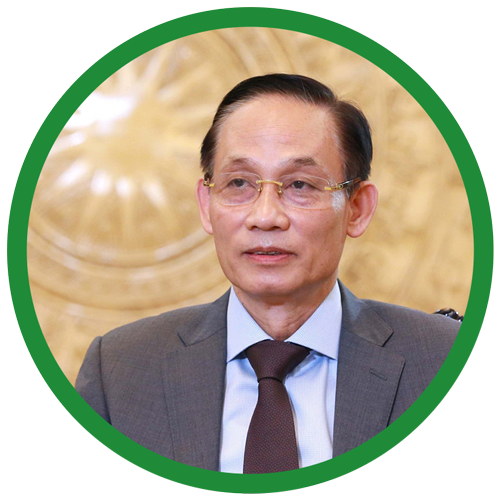CONTINUING TO RESEARCH AND PROMOTE THE SCHOOL OF FOREIGN AFFAIRS AND DIPLOMACY BEARING THE CHARACTER OF
“VIETNAMESE BAMBOO”

At the National Foreign Relations Conference for the Implementation of the Resolution of the 13th National Party Congress (the first National Foreign Affairs Conference) held on December 14, 2021, General Secretary Nguyen Phu Trong assessed that "we have built an outstanding and unique school of foreign relations and diplomacy of the Ho Chi Minh era, bearing the character of the Vietnamese bamboo, of strong roots, stout trunk, and flexible branches. (Or to quote a verse of poetry: “Such a gaunt trunk, such fragile leaves, and yet you make yourself into ramparts and walls, o dear bamboo!"). Herein lives the soul, the spirit, and the strength of character of the Vietnamese nation: To be mellow and skilful, but tenacious and ardent. To be flexible and creative, but bold, tenacious and unyielding against all odds, for national independence, freedom and happiness of our people. To stand as one, to love our fellow man, yet all the same resolute and patient in the defence of the interest of the nation-state. To know how to be gentle and how to be tough, to know the time and tide, to know ourselves and others, to know when to advance and when to retreat, “act as the situation demands,” as “the gentle cord makes a tight knot.”
General Secretary Nguyen Phu Trong also stated that this school of foreign affairs and diplomacy, bearing the character of the Vietnamese bamboo, has been developed under the leadership of the Party and President Ho Chi Minh over the past 90 years, "based on the creative application of fundamental principles of Marxism-Leninism, inheriting and building on the traditions and national character of foreign relations, diplomacy and culture, and selectively learning from the quintessence of world culture and the progressive philosophies of the times.”
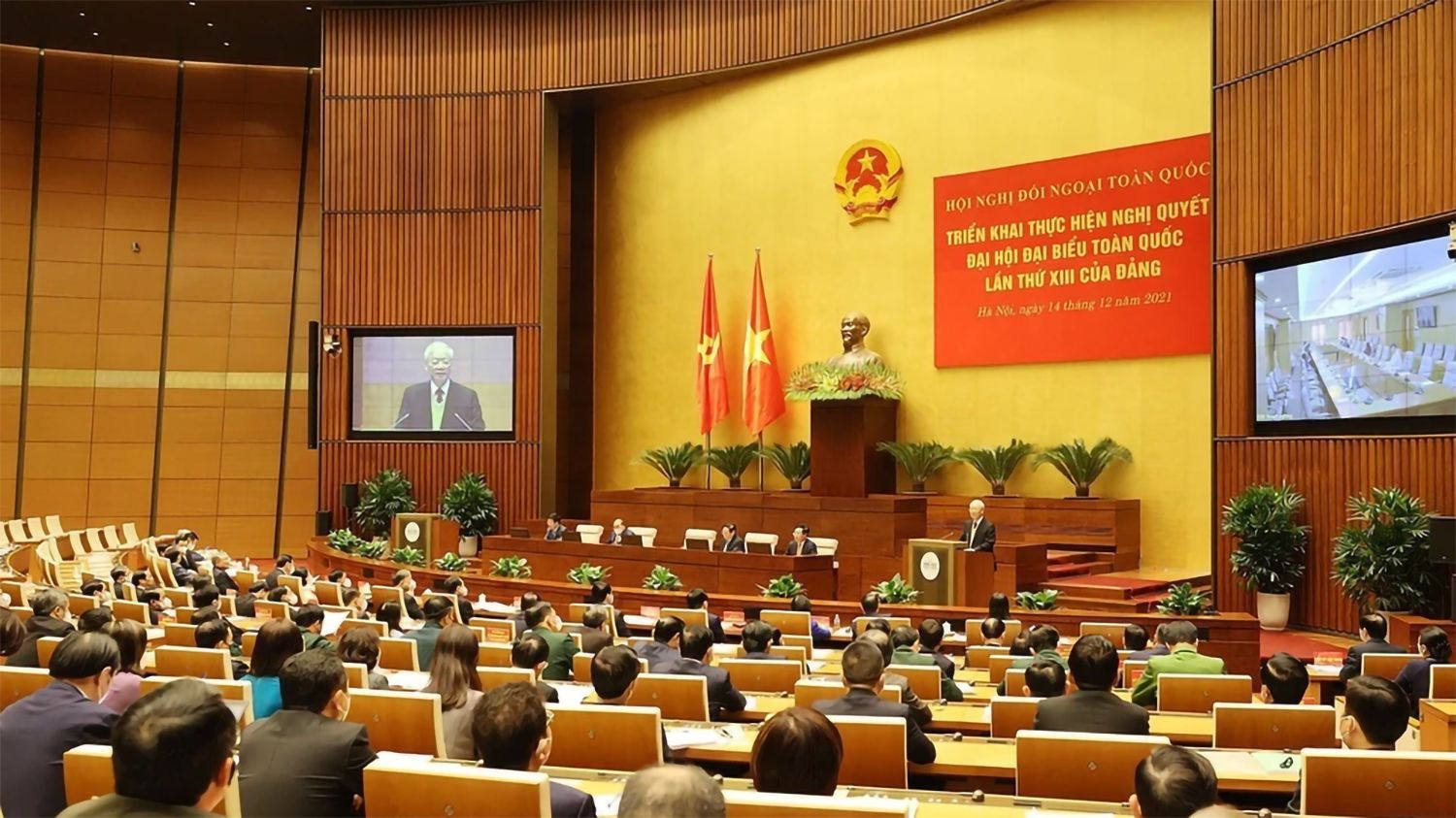
General Secretary Nguyen Phu Trong gave the remarks at the National Foreign Affairs Conference on December 14, 2021. (Photo: VNA)
General Secretary Nguyen Phu Trong gave the remarks at the National Foreign Affairs Conference on December 14, 2021. (Photo: VNA)
To further understand General Secretary Nguyen Phu Trong's thoughts on the school of foreign affairs and diplomacy bearing the character of Vietnamese bamboo, it is also necessary to continue studying his thoughts and opinions in various writings and speeches, not only in relation to foreign affairs and diplomacy but also many other fields, as well as through his direct involvement and guidance in foreign affairs activities. In this spirit, the Party Central Committee’s Commission for External Relations, the Ministry of Foreign Affairs, and the Su That (Truth) National Political Publishing House recently collaborated to publish the book "Building and Developing a Comprehensive and Modern Foreign Affairs and Diplomacy of Vietnam bearing the distinctive character of Vietnamese Bamboo” by General Secretary Nguyen Phu Trong.
Within the framework of this article, I will focus on discussing a number of contents of Vietnam’s foreign policy, which has made a significant contribution to national construction and defence and enhancing the country’s international position.
1. In his speech at the National Foreign Relations Conference in 2021, when mentioning Vietnam’s school of foreign relations and diplomacy, General Secretary Nguyen Phu Trong emphasised that all countries have to deal with two fundamental issues: domestic affairs and foreign relations in their process of formation and development. The historical reality of our nation demonstrates that foreign relations play an important role, especially due to Vietnam’s strategic geographical location in the region and the world, which always attracts the attention of many countries, including major powers.
Vietnam stretches from north to south along a narrow strip of land, with the whole north-south length facing the sea. Such geographical characteristics also present more difficulties for national defence and make it easy for foreign forces to conquer our country. Accordingly, generations of Vietnamese people have always determined that national construction always goes hand in hand with national defence.
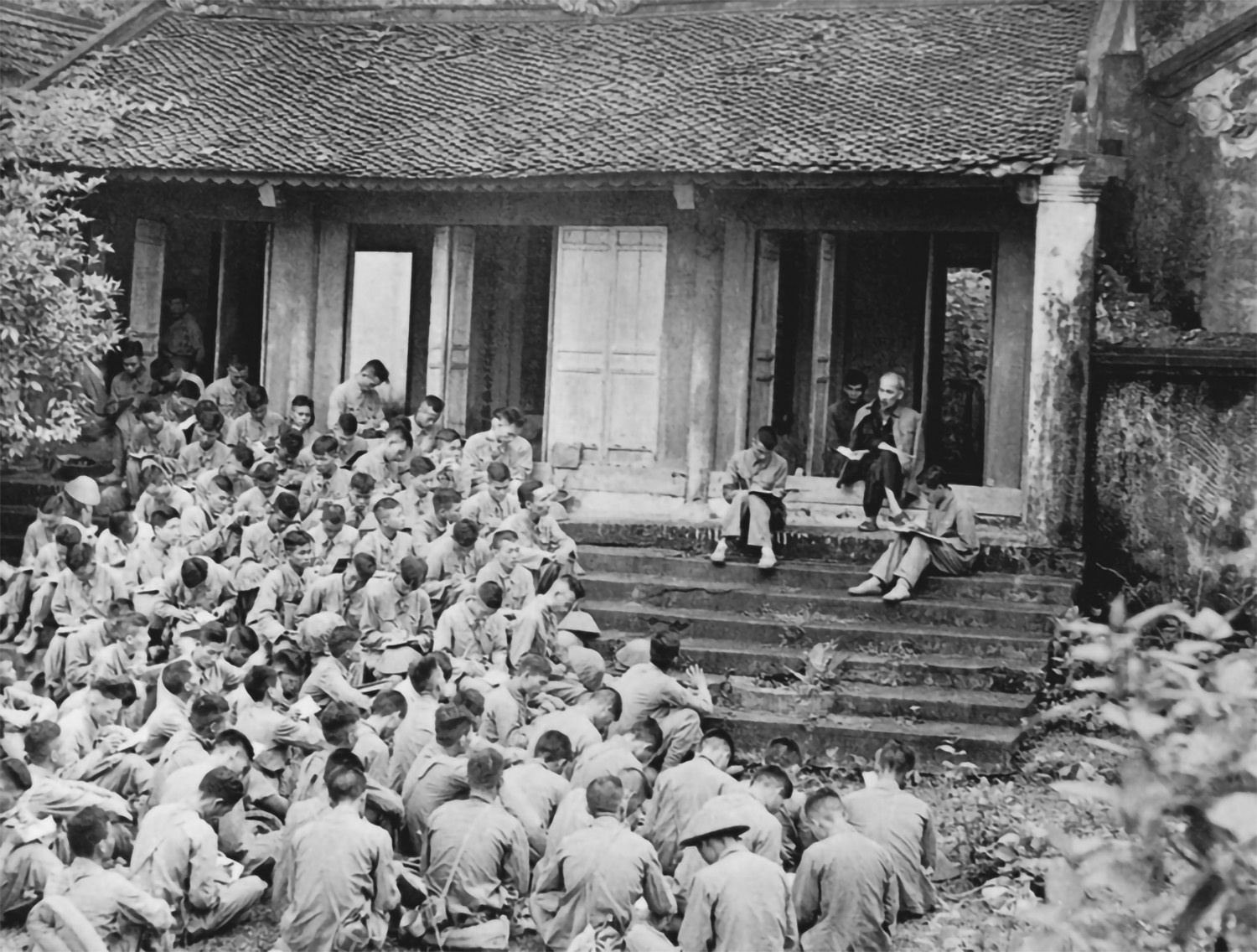
During a conversation with soldiers of the Tien Phong Division on September 19, 1954 at the Hung Kings Temple before assuming control of Hanoi, Uncle Ho said that “The Hung Kings built the nation and now we have the responsibility to safeguard the nation.” (Photo: Hochiminh.vn)
During a conversation with soldiers of the Tien Phong Division on September 19, 1954 at the Hung Kings Temple before assuming control of Hanoi, Uncle Ho said that “The Hung Kings built the nation and now we have the responsibility to safeguard the nation.” (Photo: Hochiminh.vn)
From the early period thousands of years ago, distinct cultures had been formed on the Vietnamese land, most notably the Dong Son Culture (from about the early 8th century BC to the second century AD), which had an extensive influence on southern China and some Southeast Asian countries. That culture soon developed agriculture, hunting, fishing, animal husbandry and handicraft. The Vietnamese nation soon built the Van Lang State at the height of the Dong Son Culture. During the early days of national construction, our people had to fight against aggressors, as seen in the story of Saint Giong in Phu Dong (Gia Lam, Hanoi) fighting the Yin.
In the relations with foreign countries, the Vietnamese nation is always proud to assert its independence and the determination to defend its territorial integrity, as stated in Ly Thuong Kiet’s divine poem:
“The southern king lives in the southern rivers and mountains
That fact is clearly written in the Heaven’s Book
Why dare the barbarians come to invade
You shall be totally defeated.”
The Vietnamese State views the people’s support as the nation's greatest strength. This stance featured in General Tran Hung Dao’s statement asserting that people's strength is the best long-term strategy to safeguard the country. Tran Hung Dao also affirmed the importance of relations with the foreign partners, stressing that maintaining peace is the way to rule the country and the army, maintaining peace on the border not only requires little use of troops but also helps to avoid the state of emergency. The Vietnamese people held wisdom, kindness, and justice as their strength and the appreciation for peace, as quoted by scholar Nguyen Trai: “Great justice conquers brutality. Wisdom replaces violence!” and “Ending the fires of war; paving way for eternal peace!” Following these ideologies, the Vietnamese army and people provided boats and carriages for the defeated invaders to return to their country. To maintain independence and territorial sovereignty, Vietnamese dynasties were flexible in foreign affairs.
To maintain independence and territorial sovereignty, Vietnamese dynasties were flexible in foreign affairs.
Thanks to early appreciation and active and flexible use of foreign affairs and diplomacy, generations of Vietnamese people have created peace for national construction. These were also powerful weapons when the country had to fight against foreign invaders, while affirming the national identity and enhancing the national position.
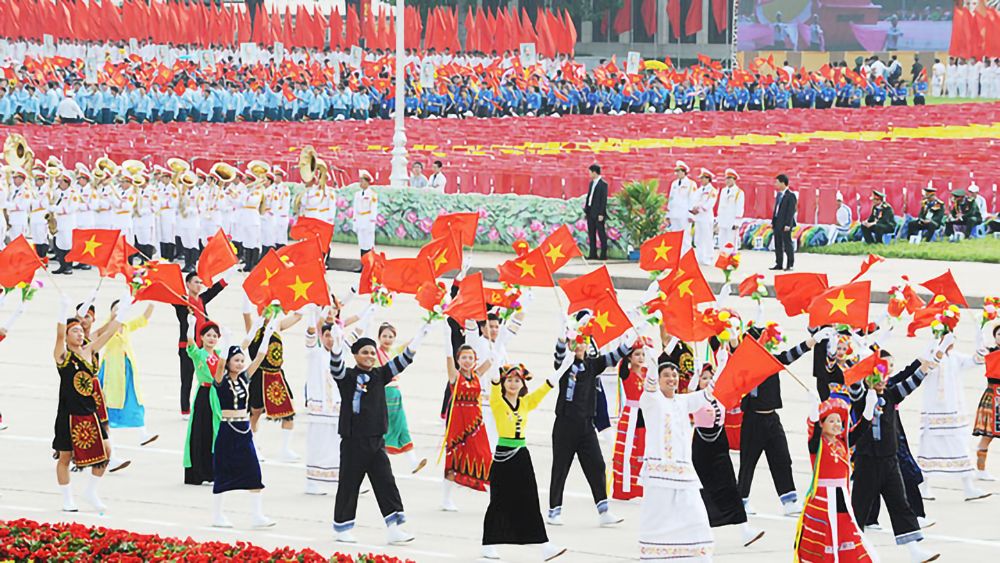
Colours of Vietnamese ethnic groups. (Photo: Baochinhphu.vn)
Colours of Vietnamese ethnic groups. (Photo: Baochinhphu.vn)
2. Marxism-Leninism, which was spread to Vietnam by Nguyen Ai Quoc (who later became President Ho Chi Minh), opened up a proper worldview and methods that were suitable for the new era. Together with the workers' and patriotic movements, it created a great combined revolutionary power under the leadership of the Communist Party of Vietnam to realise the goals of eliminating colonial and feudal rule, thus regaining and protecting national independence.
During the years of searching for a way to save the country, through political parties and people around the world, Nguyen Ai Quoc mobilised international support for the Vietnamese people’s struggle for national liberation. In early 1945, he analysed that “the best way to defeat an army is to use strategy. The second way is diplomacy. The third is to fight”. Under the leadership of President Ho Chi Minh, our Party identified diplomacy as a front in the fierce resistance war against the US, including the Party's diplomacy, State diplomacy, and people-to-people diplomacy to form a world movement to support the Vietnamese people.
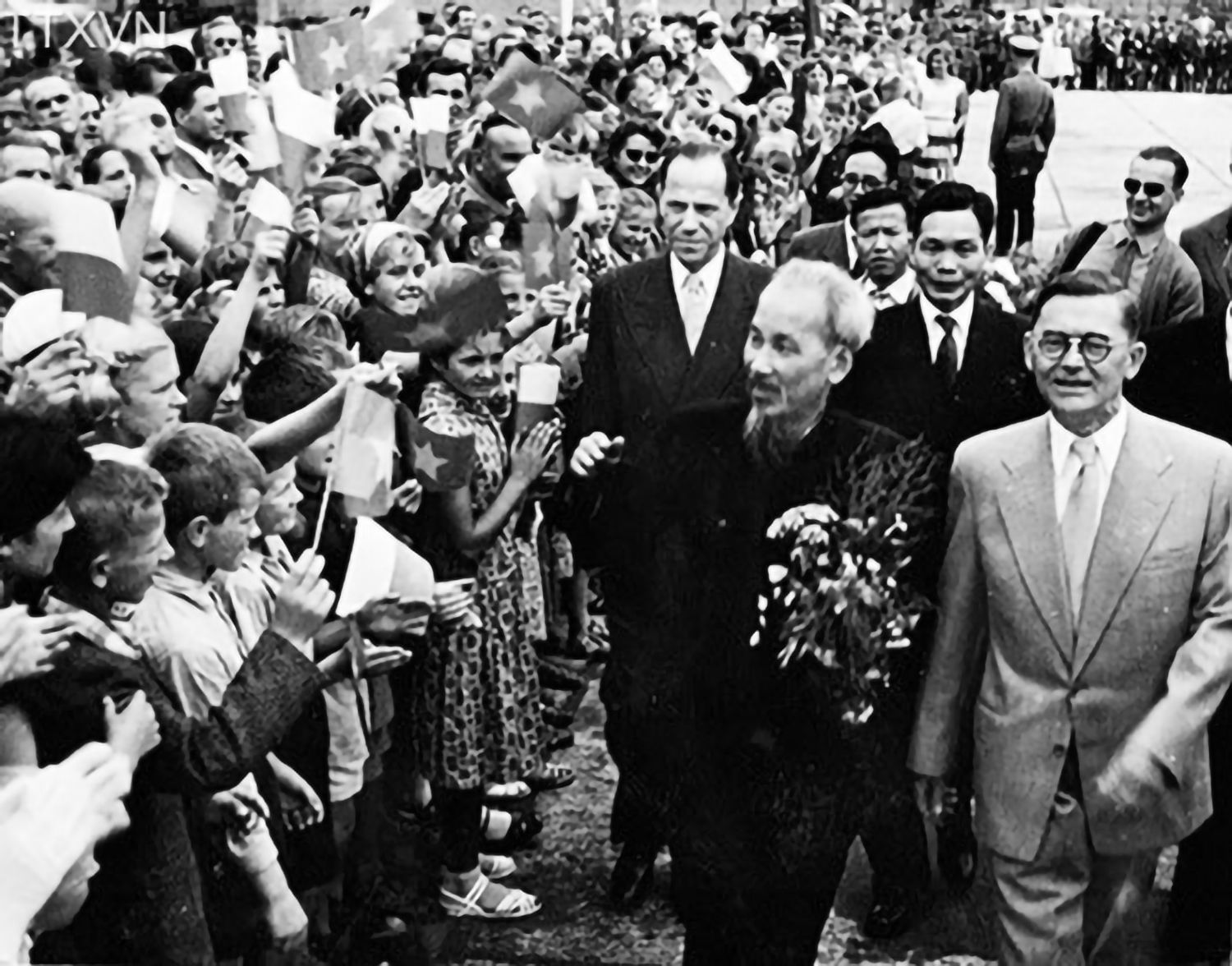
The Polish people warmly welcomed President Ho Chi Minh and the delegation of the Government of the Democratic Republic of Vietnam in July 1957. (Source: Website of Ho Chi Minh Mausoleum’s Management Board)
The Polish people warmly welcomed President Ho Chi Minh and the delegation of the Government of the Democratic Republic of Vietnam in July 1957. (Source: Website of Ho Chi Minh Mausoleum’s Management Board)
Our Party regularly evaluates the international situation to identify advantages and disadvantages, placing the Vietnamese revolution and the nation's cause in an interactive relationship with the world revolution and international trends, thereby setting out appropriate guidelines. This approach is consistent with the arguments of Marxism-Leninism about the worldwide expansion of capitalism and the productive forces, the international nature of the proletariat, and the thesis of Lenin on the position of the people's struggle in colonial countries.
An outstanding example of the Party's application of Marxism-Leninism in foreign affairs is shown in the application of Marxist-Leninist philosophical methodology to evaluate and solve raised problems. Specifically, according to the basic principles of Marxist-Leninist philosophy, it is necessary to consider international situations and events in connection and always move and develop. The basic laws and pairs of categories of materialist dialectics help understand the origin, method, movement tendency, change of situations, objects, events, and ways of influencing the movement process.
The Party regularly evaluates the international situation to identify advantages and disadvantages, placing the Vietnamese revolution and the nation's cause in an interactive relationship with the world revolution and global trends, and from there setting out appropriate strategies.
It is also especially important that Vietnam's foreign affairs and diplomacy always attach importance to promoting Ho Chi Minh's ideology. His thoughts are the crystallisation of the combination of the nation's fine traditions, East-West achievements, Marxism-Leninism, and the wisdom and personality of a great man. His thoughts are the most significant orientation in foreign affairs, expressed in his views on independence and self-reliance in foreign policy, combining national strength with the strength of the times, and peace and friendship with all nations, cultivating relations with fraternal neighbouring countries, attaching importance to relations with major countries, and showing special sympathy for oppressed peoples while supporting international communist and workers' movements. His methods and style are valuable lessons in public-minded diplomacy, immutability, adaptability, independent thinking, self-control, creativity, forecasting and seizing opportunities, and harmoniously balancing national interests and proletarian internationalism with common interests of the international community.
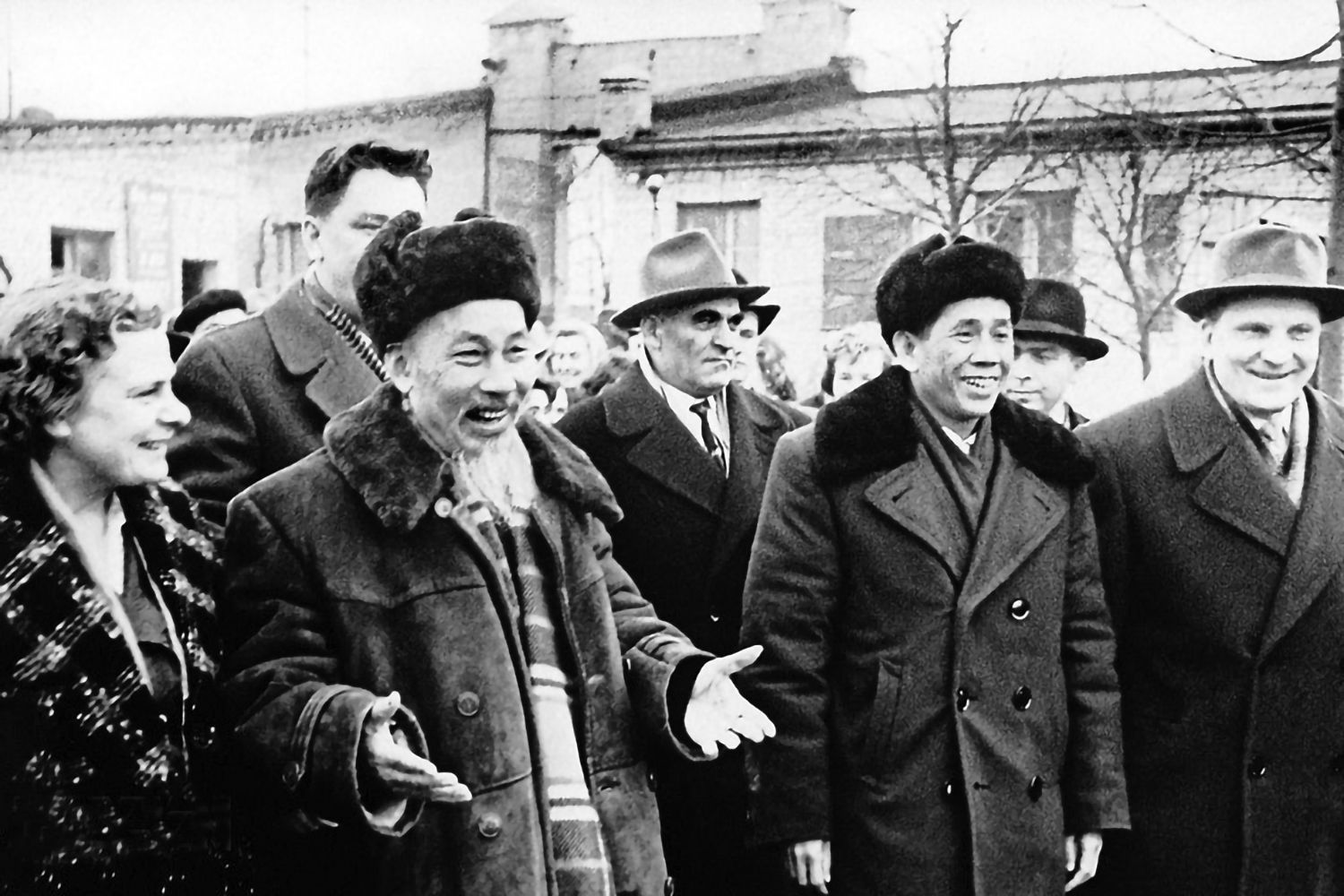
President Ho Chi Minh and First Secretary Le Duan attended the 22nd Congress of the Communist Party of the Soviet Union, 1961. (Photo: VNA)
President Ho Chi Minh and First Secretary Le Duan attended the 22nd Congress of the Communist Party of the Soviet Union, 1961. (Photo: VNA)
3. Through its leadership in successfully implementing the correct foreign policy, the Party has enlisted the support of the international communist and workers' movement, headed by the Communist Party of the Soviet Union, and the help of the Communist Party of China, the spirit of solidarity of colonial peoples and took advantage of the opportunity at the end of World War II to lead the nation to regain independence and establish the Democratic Republic of Vietnam in 1945, at which point the Party only had 5,000 members. Foreign affairs and diplomacy have made particularly important contributions to combining national strength with the strength of the times so that the nation won great victories in the two resistance wars against the French colonialists and the US imperialists, as well as in protecting the independence and unity of the country. Many effective foreign policy and diplomatic policies and measures have been deployed, such as fighting to protect national independence, world peace, and solidarity among socialist countries, while taking advantage of conflicts in the enemy ranks, both fighting and negotiating, winning step by step.
The traditions, identities, and roles of foreign affairs and diplomacy continue to be strongly promoted through the enlistment of international support to overcome the severe consequences of the war following the national unification in 1975, protect the Fatherland, and break the embargo, in addition to implementing the Doi Moi (renewal) process initiated by the Communist Party at the 6th National Party Congress (1986). President Ho Chi Minh’s ideology of combining the nation’s strength with the strength of the times, with Vietnam as a friend to all countries, is deeply recognised and actively boosted. The overarching principles for foreign affairs are to ensure the highest national interests and the unified leadership and direction of the Party. The diversification and multilateralisation of foreign relations and Vietnam’s perspective of being a friend, a reliable partner, and an active and responsible member of the international community are closely combined with the policy of ensuring defence, security, and foreign affairs in order to serve the economy, cultural diplomacy, external information services, and the affairs of Vietnamese people abroad.
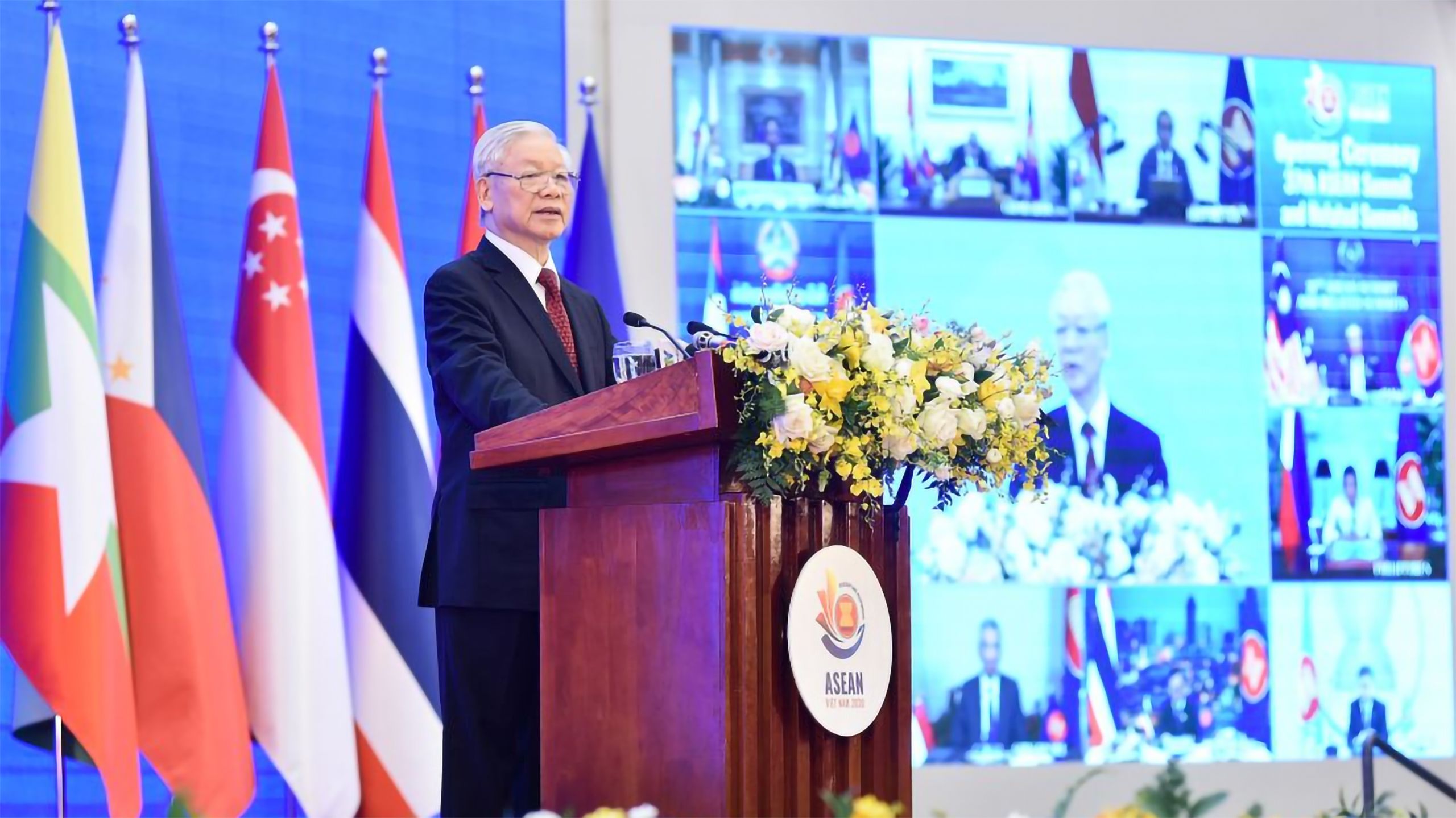
General Secretary and President Nguyen Phu Trong delivers a speech at the Opening Ceremony of the 37th ASEAN Summit. (Photo: VNA)
General Secretary and President Nguyen Phu Trong delivers a speech at the Opening Ceremony of the 37th ASEAN Summit. (Photo: VNA)
4.General Secretary Nguyen Phu Trong was entrusted by the Party, State and people with the highest leadership positions of the Party and State as well as many other important positions. He is also a highly reputable theorist both domestically and internationally, chairing and participating in many important activities of the country. Based on Marxism-Leninism, Ho Chi Minh’s ideology, and the Party’s guidelines, the General Secretary has made many considerable contributions to and imprints in foreign affairs work, directly building the theoretical perspective of Vietnam’s diplomacy imbued with the “Vietnamese bamboo” identity.
The General Secretary attached great importance to the role and position of foreign affairs. As mentioned above, he affirmed that domestic and foreign affairs are always among the basic issues of countries, noting that “foreign affairs today are not only a continuation of domestic policy, but also a strong driving force for the development of countries and peoples.”
In his statements and work instructions, the General Secretary always reminded us to put work in the context of the real situation, with comprehensive and proactive consideration to avoid being passive or surprised. He paid special attention to strategic advisory work, forecasting work, and innovation in theoretical work, emphasising that “theory must lead the way and accompany practice”, “theory must have vision and look ahead”, and “attention should be given to researching new theoretical issues of the world and new problems posed by practice”. As early as 2011, he pointed out: “Looking deeper and further, we can see that the world economy is going through a restructuring process... Politically, the world is also experiencing important changes, in which the power and position of countries are shifting.”
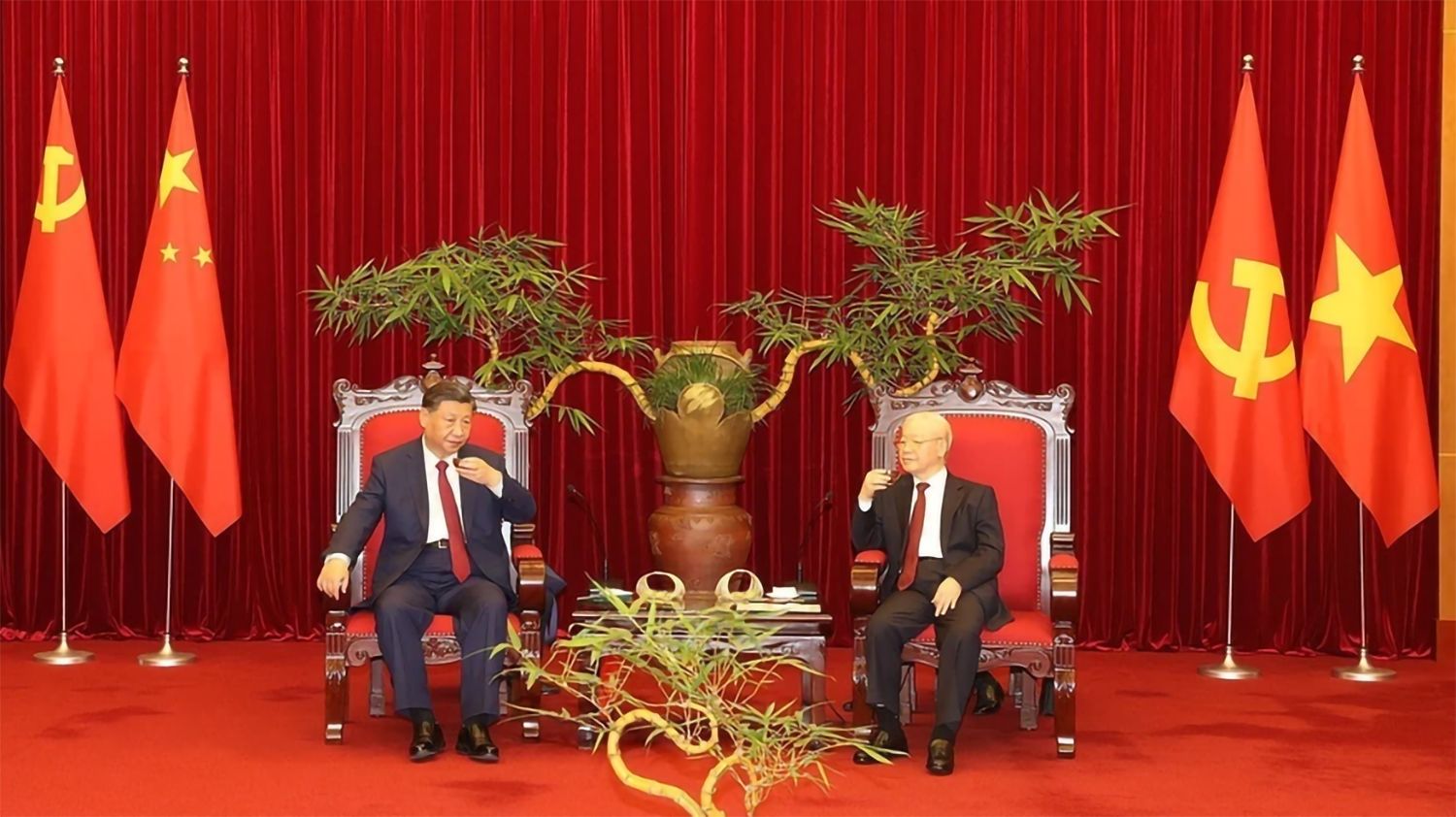
General Secretary Nguyen Phu Trong invites General Secretary and President of China Xi Jinping to attend the Tea Party, December 12, 2023. (Photo: VNA)
General Secretary Nguyen Phu Trong invites General Secretary and President of China Xi Jinping to attend the Tea Party, December 12, 2023. (Photo: VNA)
General Secretary Nguyen Phu Trong has made many important contributions to foreign affairs, building and directly drawing on the theoretical scope of the school of foreign affairs and diplomacy imbued with the identity of “Vietnamese bamboo.
When considering foreign affairs issues and directing the direction and content of foreign affairs activities, the General Secretary always reminds us to ensure guidelines, viewpoints, and principles. On many occasions, he emphasised that "if the policy is wrong, everything will fail" and analysed the policy mistakes that have led to huge losses and difficulties for the revolution in some countries, including strategic disadvantages for some countries in the region. Comrade General Secretary always thoroughly grasped the Party's foreign policy of independence, self-reliance, peace, friendship, cooperation and development, diversification and multilateralisation of external relations, to ensure the highest national interests. He attached great importance to building Vietnam's soft power, including promoting the role of international law, Vietnam's traditional cultural and diplomatic values, popular and progressive ideas of humanity; paying attention to finding common points; and upholding humanity, justice, ethics and legality in international relations to persuade and enlist the support of the world's people. He requested to study issues of core interests of the world and "build a new position and mentality of Vietnam in dealing with and handling relationships with other countries, including bilateral and multilateral." Accordingly, the three pillars — Party diplomacy, State diplomacy, and people-to-people exchange — and all forces actively and effectively deploy the Party's foreign policy and policies.

General Secretary Nguyen Phu Trong holds talks with US President Joe Biden, September 10, 2023. (Photo: VNA)
General Secretary Nguyen Phu Trong holds talks with US President Joe Biden, September 10, 2023. (Photo: VNA)
Vietnamese Party has evaluated the important contributions of foreign affairs work under the Party's leadership, contributing to the common cause of the country and outstanding achievements in foreign affairs in the overall achievements over the half term of implementing the resolution of the 13th National Party Congress. Through those achievements, the political world, researchers and international media are also increasingly recognising and showing interest in the school of foreign affairs and diplomacy imbued with the identity of "Vietnamese bamboo." To understand more deeply and fully and promote better and more effectively that school of foreign affairs and diplomacy, it is necessary to continue to study the many issues of theory, practice, and ideas, as well as the practices of leadership and the direction and activities of President Ho Chi Minh and the leaders of our Party and State in foreign affairs and diplomacy of Vietnam throughout history in relation to theoretical developments and changes in the region and the world.
Design: NHA NAM
Translation: NDO

